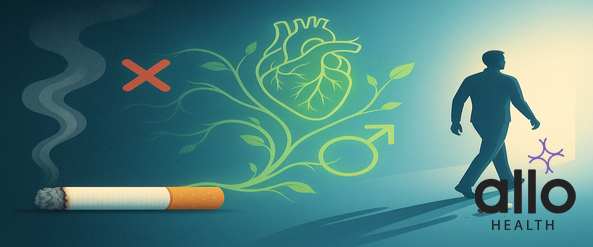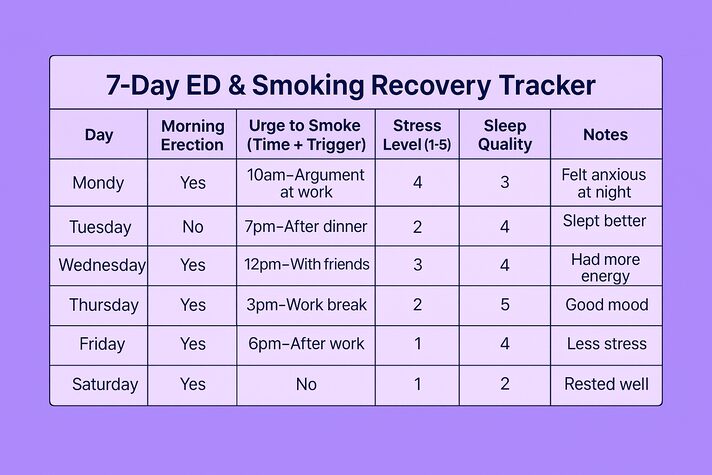5 Proven Effective Ways to Quit Smoking for ED

Smoking is one of the lesser talked about yet powerful causes of erectile dysfunction. Research shows that smokers are up to twice as likely to face erection problems compared to non-smokers. Smoking harms blood flow, damages blood vessels, lowers testosterone, and increases stress hormones, making it harder to get or keep an erection. The good news is that quitting smoking can improve ED for many men, especially those with mild to moderate symptoms. Studies have shown that 25% of men saw better erections just one year after quitting. While recovery time varies depending on age, smoking history, and overall health, support options like nicotine replacement therapy, medication, counseling, and lifestyle changes can make quitting easier and lead to noticeable sexual health benefits.
A lot of men light their first cigarette chasing the image of confidence, masculinity, or stress relief. If you want to improve your sexual health, one important step is to quit smoking for ED to protect your erections. For years, smoking has been shown in films and ads as something powerful, something cool. But behind this image is a truth that often goes unspoken, smoking can quietly damage your ability to get or keep an erection.
If you or someone close to you is struggling with erections and is a smoker, there’s a good chance this habit could be playing a role in causing erectile dysfunction or impotence.
In this article, we’ll walk you through how smoking affects erections, what benefits you can expect after quitting, and how to deal with the challenges of stopping smoking.
Can Smoking Cause Erectile Dysfunction?
Yes, there is a direct link between smoking and erectile dysfunction. This connection has been proven through multiple studies. Research shows [1] that smokers are 1.5 to 2 times more likely to experience ED compared to non-smokers.
One 2005 study [2] published in the American Journal of Epidemiology found that men who smoked were significantly more likely to report erectile problems than those who never smoked. This link was especially strong in younger men.
Similarly, a large-scale study [2] of 2,301 men from the Boston Area Community Health Survey found that long-term, heavy smoking over 20 years was strongly associated with ED.
How Does Smoking Cause Erectile Dysfunction?
But what is that about smoking which causes or worsens ED? There are different mechanisms by which smoking can cause erectile dysfunction. Let us now see how smoking can cause ED:
Poor blood circulation
Smoking can not just affect your lungs, but it can also cause interference with the healthy blood flow of the body. Poor blood flow is one of the commonest reasons by which smoking can cause erectile dysfunction.
Narrowing of blood vessels
Smoking can cause narrowing of the blood vessels that supply blood, resulting in poor blood flow to different parts of the body, including the penis. When the penis gets enough blood, erections and sexual activity are better. But this poor circulation makes it harder to achieve or maintain an erection [3].
Endothelial dysfunction
Toxins present in tobacco can damage the endothelial lining of blood vessels and reduce their ability to produce nitric oxide (NO). NO is an important vasodilator that keeps blood vessels [4] relaxed and is essential for penis erection. Less production of NO = erection problems
Cardiovascular diseases
Smoking is one of the most common causes of various cardiovascular diseases [3] like coronary heart disease, peripheral artery disease, strokes and aneurysms. These diseases are one of the major causes of erectile dysfunction and impotence in men [5]. Smoking can cause cardiovascular disease because of the presence of nicotine in cigarettes.Nicotine is the main addictive chemical in cigarettes. When someone smokes, the nicotine gets released and it raises blood pressure and heart rate [4]. This puts more pressure on the heart and increases the risk of heart attack or stroke.
Hormonal imbalances
Smoking can also disturb the balance of hormones in the body, especially those that affect sexual health.
Decrease testosterone production
It has been seen that smoking may lower testosterone levels [6], the main hormone that controls sex drive and erections.
Increase cortisol production
At the same time, smoking may increase cortisol levels [7], the hormone your body releases during stress. Higher cortisol can hinder testosterone production and lower sexual desire.These hormonal changes, gradually can decrease sexual performance and make the erections hard enough causing sexual dysfunction.

Will ED Get Better If I Quit Smoking For ED?
Now that you are aware of how smoking can cause ED, you might be wondering what if I quit smoking for ED, will my ED improve?The answer is yes. If you are a smoker and you feel difficulty achieving erections, quitting smoking can create a win-win situation for both you and your partner.
This has been backed by research. In one study, men with erectile dysfunction who quit smoking saw real improvements [1]. Around 25% of ex-smokers reported better erections after just one year, while those who continued smoking saw no change.
This study was based on a large survey of 2,301 men, and it showed that the more someone smoked, the higher their risk of ED. This risk also increases especially if they had smoked heavily over the years.
But how does quitting smoking improve ED? It helps by:
- Improving healthy blood flow to the entire body including the genitals
- Supporting the repair of endothelial function
- Lowering the risk of cardiovascular diseases
- Promoting hormonal balance
All of these factors play a strong role in the development of ED. Balancing them gives your body a better chance to heal and improves sexual performance over time.

Real Results from Men Who Quit Smoking
We looked at data from over 10,000 men who came to Allo Health with smoking-related erection problems in the past two years. Here’s what we found:
-
About 70% of men under 40 years of age reported noticeable improvement in erectile function within 6 to 9 months after quitting smoking.
-
Men who smoked more than 10 cigarettes daily were over twice as likely to require medication for ED compared to the people who smoke less
-
Younger men (ages 25–35) showed quicker and more consistent improvement after quitting smoking, with nearly 65% experiencing better erectile function within 6 months.
How Long After Quitting Smoking Does Erectile Dysfunction Improve?
But if you’ve quit the habit, you may now be wondering: How long after quitting smoking does erectile dysfunction improve? The answer is that it depends from person to person. Some men have seen changes as early as six months, while for others, it can take up to a year.
Now that it’s clear quitting smoking helps reduce the risk of erectile dysfunction, the main question that remains is: how much time does it actually take to see improvement? There is no fixed time duration.
In one study, many men reported improvements in erectile function after 6 months [4] of quitting smoking, whereas in another study, men said they started noticing firmer erections after one full year [8].
But this timeline depends on several other factors also like:
- How much the person smoked regularly
- For how many years they were smoking
- Age of the person
- If they have any underlying health issues like heart disease or diabetes
Can every man fully recover from ED just by quitting smoking? Unfortunately, no. Some smokers with severe erectile dysfunction may not regain normal erections even after quitting. For them, quitting might still help, but it won’t be enough on its own. They should consult a healthcare professional for medications or other treatments.
How To Stop The Urge To Smoke?
We understand that the decision to quit smoking is not easy. It comes with its own set of challenges. A lot of people feel strong urges and cravings to smoke, mostly because of nicotine addiction.
But the good news is that there are ways to manage these cravings. Some of them include nicotine replacement options, mental and emotional support, and helpful therapies.
Nicotine replacement therapy (NRT) [9]
This includes products that give you small amounts of nicotine without the harmful chemicals in cigarettes. They help reduce cravings and ease withdrawal symptoms. Common forms of NRT products include:
-
- Nicotine gums
- Nicotine nasal spray
- Skin nicotine patches
- Nicotine lozenges and tablets
- Nicotine inhalers
Prescription medications
These are nicotine-free medicines, often called “stop smoking medicines [10].” They are usually prescribed by doctors. Most of them work by blocking nicotine’s effect [10] in the brain, so you don’t feel the same pleasure from smoking.
Cognitive and behavioral support
Quitting any addiction is tough, and smoking is no different. A lot of support groups, apps, and quit services are available [11]. These groups help you manage cravings and avoid going back to smoking. Cognitive and Behavioral support is one of the most effective ways to help you quit smoking [12].
Mindfulness techniques
Practices like meditation, yoga, and even hypnotherapy are becoming popular nowadays for quitting smoking. These techniques help calm your mind and reduce stress-related triggers [13].
Personalized counselling
If you prefer private support, you can talk to a counselor who specializes in addiction. They can help you make a plan and give you the tools you need to stay smoke-free.

Make a tracker at home
You can try maintaining a simple 7-day tracker at home. Just note a few things each day: like whether you had a morning erection, any strong urges to smoke (with time and trigger), your stress level, and how well you slept. After a week, you can take this tracker to your doctor. It gives a clearer picture of what’s affecting your erections, and helps your healthcare provider create a stronger, more personalized plan for your recovery.

Final words
If you are dealing with erectile dysfunction, quitting smoking is an important step. From damaging blood vessels to messing with hormones, smoking disrupts the systems that support a healthy sex life. The good thing is that ED caused by smoking is not always permanent. Many men can notice the real improvement after quitting.
It is a long journey and is not about expecting everything overnight. You may require help, support and counselling. It is always better to talk with a healthcare professional about your concerns.
Still, it’s not just about putting down the cigarette one day and hoping everything goes back to normal. The body needs support. Your mind needs support. And that’s where talking to a healthcare professional becomes important.
“Quitting smoking can significantly improve erectile function, especially in men without severe vascular damage. But to see long term effects, right guidance combined with a treatment plan is what patients require.”
"The following blog article provides general information and insights on various topics. However, it is important to note that the information presented is not intended as professional advice in any specific field or area. The content of this blog is for general educational and informational purposes only.
Book consultation
The content should not be interpreted as endorsement, recommendation, or guarantee of any product, service, or information mentioned. Readers are solely responsible for the decisions and actions they take based on the information provided in this blog. It is essential to exercise individual judgment, critical thinking, and personal responsibility when applying or implementing any information or suggestions discussed in the blog."






